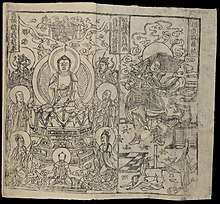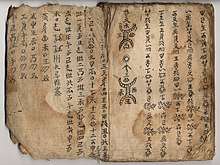Endangered Archives Programme
The Endangered Archives Programme (EAP) is a funding programme and digital archive run by the British Library in London. It has the purpose of preserving cultural heritage where resources may be limited. Each year EAP awards grants to researchers to identify and preserve culturally important archives by digitising them in situ. The original archival material does not leave the country of origin, and projects often incorporate local training and career development. EAP focuses on material created before the mid twentieth century.[1]


Related programmes also sponsored by Arcadia include the Endangered Languages Documentation Project at SOAS University of London, the Endangered Knowledge Documentation Programme at the British Museum, and the Modern Endangered Archives Program at University of California, Los Angeles.
Projects
As of 2019 EAP had funded over 400 projects. Some of these have received media coverage, including projects on manuscripts containing magical texts from Djenne, Mali,[2] and the Islamic libraries of Timbuktu, Mali, which are under threat of destruction by war,[3] collections of palm-leaf manuscripts from Sri Lanka,[4] and archives from Brazil.[5]
Digital collections
The digital collections of the Endangered Archives Programme comprise over 7 million images and 25,000 sound files. The digital material includes manuscripts, printed books, archival documents, photographs, and early sound recordings.[6] The original material and digital files remain in the country of origin, copies being made available to researchers on the EAP website. EAP collections come from Africa, Asia, the Americas and the Caribbean, Russia and Eastern Europe.
History
Since 2004, the Endangered Archives Programme has been administered by the British Library with the financial support of the Arcadia Fund. The Programme was initially based within the Asia, Pacific and Africa Collections (APAC) of the British Library and had two full-time members of staff, with the directorship being the responsibility of the head of APAC. In 2011, EAP moved to the newly formed Digital Scholarship section of the British Library. Previous directors include Graham Shaw, Susan Whitfield, Aly Conteh and Adam Farquhar. The Programme is chaired by the principal adviser to Arcadia; Barry Supple (2004–2007) and Anthea Case (since 2008). In 2018, a second phase of the Programme began with a further grant from Arcadia when EAP moved to the Collections and Curation department of the British Library.[7] Sam van Schaik was appointed the first head of EAP in February 2019.[8]
Similar projects
- Unlocking Our Sound Heritage – UK project for digitising project for audio archival material
- Unlocking Film Heritage – UK project for digitising audiovisual archival material
- Theatre Archive Project – for British theatre history
- Qatar Digital Library
Citations
- Crace, John (2006-09-05). "Preservation hoarders: An unpromising-looking archive is doing much to save precious material for future generations". The Guardian. Retrieved 2019-10-08.
- Starkey, Jerome (2012-12-01). "Mali's Ancient lore of love and magic that al-Qaeda would like to destroy". The Times. Retrieved 2019-10-08.
- Kershaw, Sarah (2016-01-21). "The race to save ancient Islamic manuscripts from terrorists who want them destroyed". The Washington Post. Retrieved 2019-10-08.
- Balagobalan, Poongulaly (2019-07-12). "How Sri Lankans are Preserving History, One Manuscript at a Time". The Global Press Journal. Retrieved 2019-10-08.
- Campbell, Courtney (2016-05-09). "From invisible to digital: digitising endangered historical documents in Brazil". Open Democracy. Retrieved 2019-10-08.
- Sulcas, Roslyn (2015-02-17). "British Library Expanding Its Endangered Archives Online". The New York Times. Retrieved 2019-10-08.
- "New Grant to the Endangered Archives Programme". 25 September 2018. Retrieved 8 October 2019.
- "Sam Van Schaik". The British Library. 14 February 2019. Retrieved 8 October 2019.
References
The following is a list of academic articles based on EAP projects and digital collections:
- Bazarov, A (2018) "The Buddhist Book Culture of the Average Person and Buryat Identity" in Sibirica, Volume 18
- Biagetti, S., Kaci, A., Mori, L., & di Lernia, S. (2012) "Writing the desert: the ‘Tifinagh’ rock inscriptions of the Tadrart Acacus (southwestern Libya)" in Azania: Archaeological Research in Africa, Vol 47, 2012, Issue 2
- Butler M and Bliss D.A (2018) "Digital Resources: The Hijuelas Collection" in Latin American History, Oxford Research Encyclopedias DOI:10.1093/acrefore/9780199366439.013.618.
- Fathurahman, O. (2018) "Female Indonesian Sufis: Shattariyah Murids in the 18th and 19th Centuries in Java" in Kyoto Bulletin of Islamic Area Studies, Kyoto University, Issue 11
- Hijjas, M. (2017) "Marks of many hands: Annotation in the Malay manuscript tradition and a Sufi compendium from West Sumatra" in Indonesia and the Malay World, Vol 45, 2017, Issue 132
- Jerkov, A and Milnovic V (2018), “Using Innovative Technologies in Preservation and Presentation of Endangered Archives” Lecture Notes in Computer Science (LNCS), Revised Selected Papers, Springer-Nature Verlag, Vol. 10605.
- Mishra, S. and Raj Y (2017) "Gayalal Papers, 1940–1969 v.s.: Life at a Low Rung in XIX Century Military Bureaucracy" in Studies in Nepali History and Society, Vol 22, Number 2 (ISSN: 1025-5109) pp 399-470
- Ngom, F. (2017) "West African Manuscripts in Arabic and African Languages and Digital Preservation" in African History, Oxford Research Encyclopedias
- Ngom, F. and Castro, C. (2019) "Beyond African orality: Digital preservation of Mandinka ʿAjamī archives of Casamance" in History Compass 17.8.
- Ngom, F. and Castro, C. (2019) "Beyond African orality: Digital preservation of Mandinka ʿAjamī archives of Casamance" in History Compass
- Peacock, A.C.S. (2019) "Arabic Manuscripts from Buton, Southeast Sulawesi, and the Literary Activities of Sultan Muḥammad ʿAydarūs (1824–1851)" in Journal of Islamic Manuscripts, Volume 10: Issue 1, pp 44-83 Brill
- Philips, J. (2014). "The Early Issues of the First Newspaper in Hausa Gaskiya ta fi Kwabo, 1939–1945" History in Africa, 41, 425-431.
- Qobo, CKM (2010), “Challenges of Digitizing the Endangered Lesotho Royal Archives.” ESARBICA Journal 29.
- Robinson, G (2014), “Break the rules, save the records: human rights archives and the search for justice in East Timor.” Archival Science 14.3-4.
- Silva, S (2018), “Endangered Archives Programme: experiências arquivísticas e a digitalização de documentos históricos na Paraíba” Revista Accesso Livre No. 9.
- Suliman, R (2019), “Renewal of the 14-year journey of the endangered archives programme.” Alexandria: The Journal of National and International Library and Information Issues 1.11.
- Thapa, S (2015), “Endangered Archives Programme and Digitisation of EAP-676: Manuscripts in Nepal”, Abhilekha, No. 33 (2072 VS).
- Zeitlin, D (2008), “Archiving a Cameroonian Photographic Studio With the Help of the British Library Endangered Archives Programme.” African Research and Documentation 107.